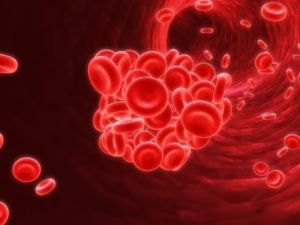Anemia may not seem very serious, but if it is not treated it can lead to significant health problems. Fortunately, you and other senior care providers can work together to treat the anemia and even help prevent it from happening again.

3d rendered close up of a blood clot
What is Anemia and Who is at Risk?
Anemia is a lower red blood cell count than what is typical. Red blood cells help carry oxygen to the body’s tissues and organs. With fewer red cells, these tissues and organs become oxygen-starved. The heart and lungs work harder trying to provide, which causes them stress. Over time, anemic seniors can experience organ failure, heart disease and more.
Seniors that have a genetic history of anemia are at higher risk to develop the condition. Those that struggle to eat a healthy diet or keep control over chronic illnesses are also more likely to develop anemia. Age, cancer, intestinal disorders, and kidney issues are other factors in whether someone is likely to become anemic.
Recognizing Anemia Symptoms in Seniors
It’s important that seniors don’t struggle with anemia for long. That’s why learning the symptoms is a key part of caring for your aging relative. Other family members, friends, and senior care providers should also be on the lookout for symptoms.
Here are some of the most common symptoms of anemia in the elderly:
- Fatigue
- Headaches
- Dizziness
- Weakness
- Pale skin
- Cold hands and feet
- Irregular heartbeat
- Shortness of breath
- Chest pain
As you can see, many of the symptoms of anemia are like many age-related conditions and illnesses. You and the senior care provider should not ignore the symptoms, thinking they are just part of the elderly adult’s old age. They need a doctor to perform a simple blood test to determine whether they truly have anemia and to start treatment.
Treating Anemia in Elderly Adults
The doctor usually recommends that elderly patients with anemia take oral iron supplements. Family caregivers and senior care providers should always give the elderly person food when they take the iron pills as they can cause nausea, diarrhea and stomach pain.
Another way that you and the senior care provider can help with treating an anemic senior is by modifying their diet to include iron-rich foods. Many seniors struggle to prepare nutritious meals and therefore deprive themselves of key nutrients like iron. Boosting their intake of iron is easy when you include ingredients like red meat, nuts, green vegetables, leafy vegetables, egg yolks, whole grains, and seafood.
If your aging relative has reached the point where they’ve developed anemia, you and their senior care provider can be on hand to prevent it from worsening by following the doctor’s orders for treatment. If they have not yet been diagnosed, you and their senior care provider can modify their diet to hopefully prevent the condition from ever developing.
If you or an aging loved one is considering Elderly Care in Manteca, CA, or the surrounding areas please contact the caring staff at ApexCare®. Proudly Serving Sacramento, Placer, Yolo, Solano, San Joaquin & Stanislaus counties. Call Today 877-916-9111
Source:
